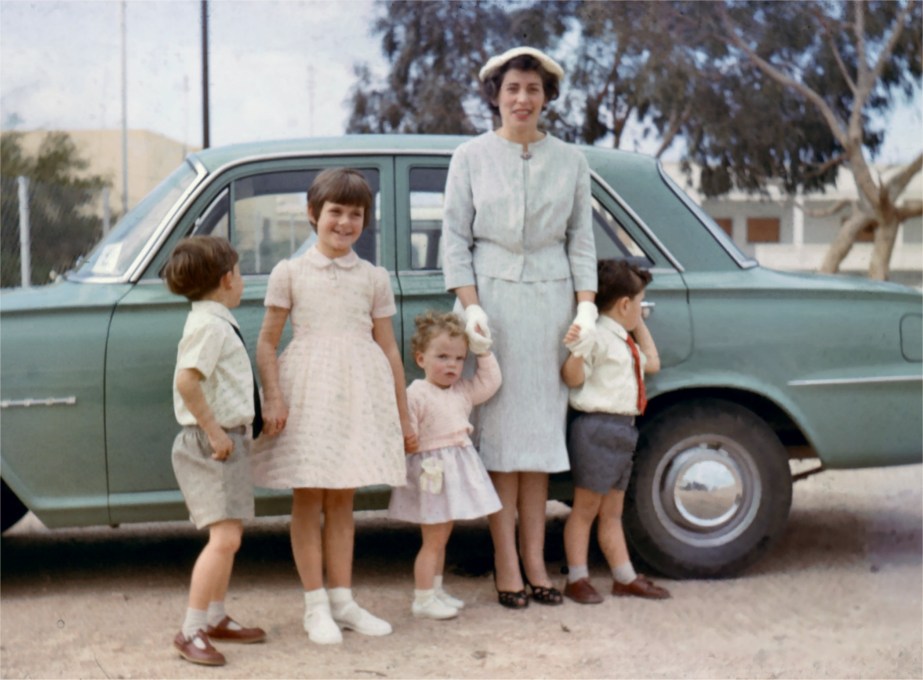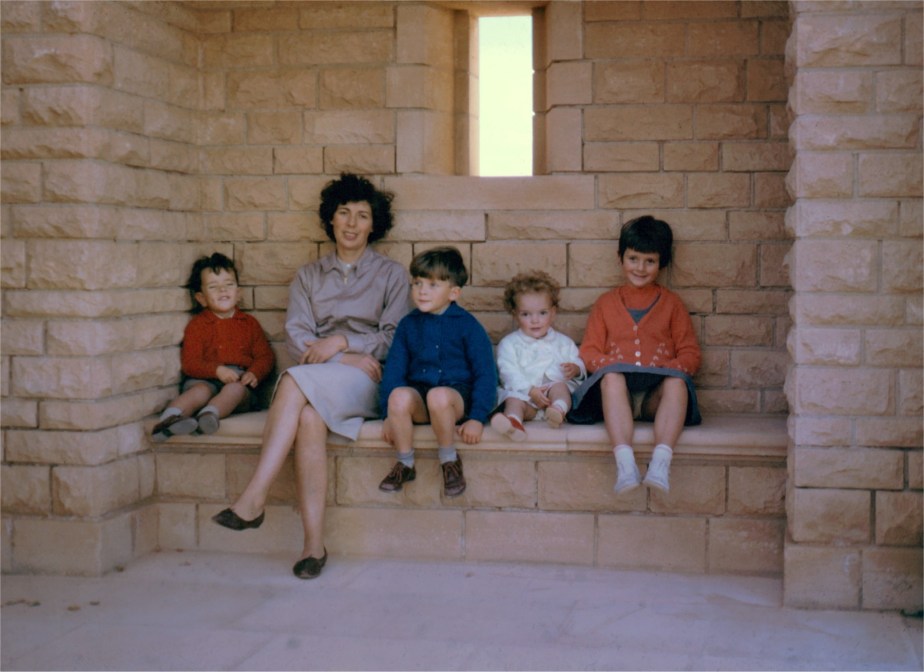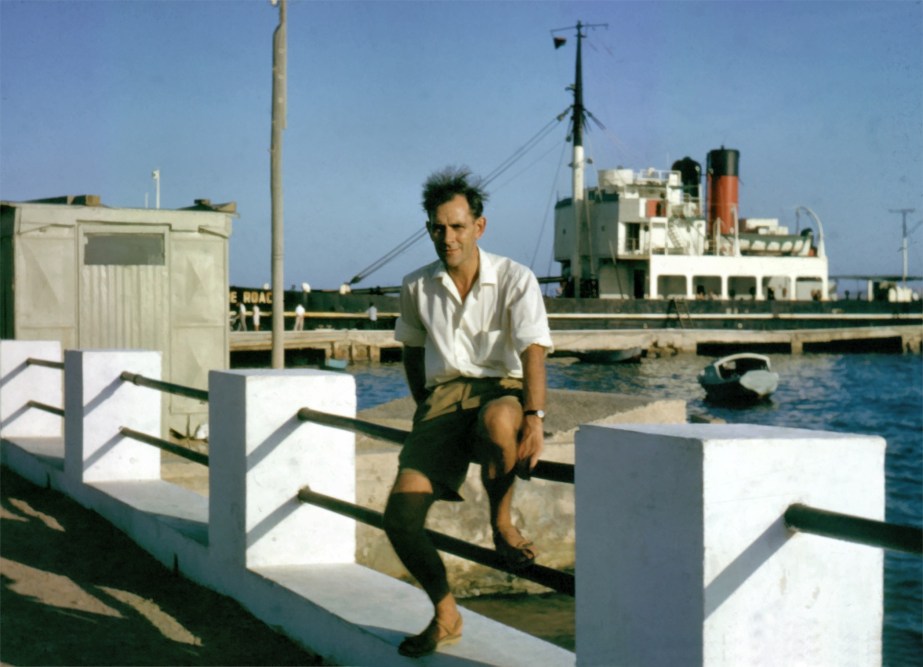Holiday in Egypt
By George Weallans, 1999
I was working in Libya accompanied by my wife and family when we decided to go to Egypt for a holiday. The first hurdle was to get exit and re-entry permits, I could not have one without the other. The exit permit was obtainable only at Benghazi, which is some three hundred miles through the desert from Tobruk. Fortunately a friend, Colin, offered to take our passports and get them stamped. I was saved from a long trip of sweat, dust, and sand. With the exit stamp I could get the re-entry permit, except the local Official did not think going on holiday to Egypt was a good enough reason to leave and come back into the country. I bent the truth a little and said we were going on holiday to England and got the stamp. I had been collecting Sterling for some time because it was more acceptable than Libyan currency in Egypt.

The car, a Vauxhall Victor, was loaded then the petrol tank was filled and finally the family got in and we were off. The passengers were Peggy and George, parents, and the children Dianne, John, Nigel and Susan; aged eight six four and two or there abouts. The car had a bench seat at the front so we fitted in easily enough.
We drove about thirty miles to the border at Salum and passed with little fuss out of Lybia. The Egyptian border post was harder. There was a brief search of our bags and the amount of money we were taking into the country was entered in our passports, I declared about half the true amount. Sterling had a higher Black Market value. They also made a note of our cameras and binoculars, in case we decided to sell them. Visiting foreign cars were given temporary Egyptian numberplates but this Border post had none available so I was given a piece of paper, with Arabic writing, instead.
Because we had no Egyptian money we stayed that night at an hotel. Dinner was quite good, unfortunately one of the children woke up and Peggy went to see to him. During our time in Egypt this happened quite often. One of the waiters offered to change some Sterling for me but I was too close to the border for Black Market dealing and there was no legal way he could exchange money at the legal rate. Next morning a village official reluctantly changed a few pounds at the official going rate. He had to get out of bed earlier than usual to serve me.

We drove along the coast road following in reverse to the route of the Desert Rats; the War Graves and memorial at El Alamain were startlingly clean and white. One of my classmates is buried there as a captain. He volunteered for the Pioneer Corps because he thought he could get rapid promotion. He was part of the big push against Rommel. We had already seen how well these memorials are looked after at Knight’s Bridge. The sea was an amazing blue until I took off my sunglasses but it was then Mediterranean blue, which with the sun sparkling on it was still brilliant.
Egypt had not long been a republic so the rulers were still very security conscious but we motored along the coast quite happily till an armed soldier stopped us. Our numberplate chit meant nothing to him, even if he could read. He squashed onto the front seat with his rifle and pointed down the road where shortly we came to a checkpoint. There one man in civilian clothes questioned me in good English while another examined our belongings and found two hundred cigarettes. The first man seemed to be in charge of the post and must have said to ignore the fags. He was satisfied with our story, asked where we were going and got in the car. The family was excited rather than frightened by this activity.
He went with us to our hotel, the best in Alexandria, and had me park in a no-parking zone, while we booked in and occupied our room. He then went with me to a garage to park the car while we stayed in Alexandria and gave some instructions in Arabic. The car was put in a corner and three days later when we left, the car had been cleaned inside

and out. There was no charge for parking or cleaning, I must have had a powerful passenger. We saw the usual sights in this port but what I remember most is the smell of the drains and the waste from horse drawn carriages. The other memory is of ordering small chicken in a restaurant, translated using schoolboy French, from the menu. When served they were very small, I would guess about two day old chicks split open and fried. We ate the vegetables. The waiter would thank Allah and take the chickens home to someone who could appreciate them.
We left for Cairo. The banks of the Nile were an astonishing cool green after the glare of the desert. The children were fascinated by a wheel lifting water to irrigate the land. An ox was tied to a pole that drove the central axle of the machine so the animal went round and round in circles, the same system was probably used by the Pharoes. John wanted to know why all the men were still wearing their pyjamas. All went well until on the outskirts of the city we needed to stop to attend to one of the children. I pulled onto the hard shoulder of the road but it was soft. The back wheels span and the sand flew but we were stuck. The children screamed a little but their mother calmed them. Four of the local youths ambled up and pushed the car back on the road. One of them was wearing a Boy Scout belt and he stopped the others clamouring for money
I asked a man for directions to our hotel, he spoke good English, and he put a boy in with us to act as our guide. The boy spoke only Arabic but knew where we were going so pointed left or right till we arrived at the hotel, I gave him the expected small coins. When we tried the bath at the hotel, water ran on the floor. Son John saw that the waste pipe had come off. We rammed it back on and all was well. The rooms were comfortable, but the locals and the traffic made a lot of noise both day and well into the night.
At that time I was using an electric razor. The plug did not fit the local sockets. So although the razor’s voltage was adjustable, I could not shave. I went to an open fronted barber’s shop and had a close shave from him although he spoke no English and used tepid water. He held his hand out and I kept putting money into it, he kept shaking his head until he decided I had overpaid enough
Our friend Colin had already had a holiday in Cairo and recommended a merchant in that city. We found his place of business without much wandering. After introducing ourselves he made us welcome with mint tea and fizzy drinks for the children. It is debatable whether he remembered our friend but it was always worth having another customer. We were each given a little gift, John promptly broke the legs off his ivory camel and was given another. Peggy had a brocade evening scarf with tassels, which she never wore, Dianne’s gift was a scarab ivory bracelet and I still have my ivory paper knife. What the other children were given has vanished in the mists of long ago. I took one of the children to the toilet which was joint Arabic and European, a hole in the floor and a normal loo. Neither had been cleaned for some time. Our youngest used a cushion she was sitting on in lieu.
We bought a number of souvenirs including a gold ring with an Alexandria stone that appears to be a different colour by daylight from artificial light. Also purchased were inlaid wooden trays, jewel boxes and two copper wall plaques inlaid with silver, showing items from the tombs. When I mentioned English money the door was closed and we were offered special prices. Haggling was still needed to get a bargain. After the recent deposing of King Farouk, richer people were afraid the local pound would collapse so liked to tuck away a few of our larger notes. Peggy wanted a charm bracelet that he could not supply so he took us to one of his brothers and promised we would be well treated.
The goldsmith, one of many in the Souk, offered the usual drinks. He showed us some of the jewellery that had belonged to Queen Narraman before she and her husband had fallen to the revolution. It was quite crude with mixed gemstones and badly finished. Peggy had her wrist measured and the bracelet was made while she chose which charms were to be put on it and we discussed the price at Black Market rates. One of these two traders found a guaranteed honest guide for us.

We hired this guide to take us round Cairo. He took us to a perfume shop in the Souk that could duplicate any Western fragrance and another where we bought some silks. We went to the Citadel on top of the hill. Bits of alabaster cladding were falling off so we collected a sample. We went in the huge mosque where Peggy and I wore dusters on our feet instead of removing our shoes. Dianne created a fuss because she was not given any. We also visited the Museum where the mask of King Tutenkhamen made a lasting impression. This is not a travelogue, get a book from the library for further information.
We went to other tourist spots but the children got tired in the heat so we paid off the guide, rather to his surprise. He expected us to use him all day. I in turn was surprised that his modest fee included the price of the taxi we had used all day.
When it was nearing time to go home to Tobruk we saw a dress in a shop window that Dianne fancied. To help to use up our Egyptian currency we went in to buy it. We had chosen one of the few establishments where English was not spoken. The Egyptians love children so with a lot of laughter and gestures we got a dress that fitted. At that time you could not change money back into Sterling nor take much out of the country.
Eventually we set off for home. I was running a bit low on petrol but expected to buy some at Sidi Berrani, a town that had figured large in the news during the Dessert War and later in a comedy radio show. Its wartime importance had nothing to do with the size of the place, about six shacks and of course no petrol. Two of the “houses” were built using empty ammunition boxes. This was quite common in the desert at that time.
We pressed on along the coast road until we ran out of petrol and came to a stop. I raised the bonnet of the engine to show we were in trouble. My gallant wife Peggy soothed the children and kept calm, whatever she thought of me stranding the family on a desert road. We could expect the first vehicle that came along to stop and help us.
When a Landrover arrived the passenger was an army security colonel who had been to Sandhurst. He was a great admirer of Stanley Mathews, the greatest right wing footballer there has ever been. He used to play for Stoke City, which was once Peggy’s hometown. We chatted happily for a while, his sister had known the author H G Wells. They must be a well to do family. Unfortunately his driver had unloaded the Jerry Can of spare petrol that morning because of a leak. We were given a note to give to the next patrol that came along and I was told to call in at the border post building. The patrol NCO did not speak English and I could not stop him putting six gallons into my tank.
When we got to Customs an official began to rummage in our bags but stopped when I told him that I was going inside to see my friend the officer. I thanked our benefactor and he immediately said “There will be no charge” which was just as well since I had not enough Egyptian money to pay for more than two gallons of petrol, it would not have been fitting to offer illegal Sterling. He sent drinks out for the children. After a few pleasantries and my repeated thanks we were on our way.
There was a steep climb up the escarpment to the Libyan border post. The car engine complained a bit at the low grade petrol but we were grateful to be nearing home. The Customs Officer showed little interest, except in the fact we had been to Cairo and had no damage done to the car.
Perhaps because of the children we were treated with kindness everywhere we went. I regret that they were too young to remember much of the holiday.
Back to the top of the page
Back to Stories by my Father-in-law
Two other stories by George Weallans:
Tales when young (1920s and early 30s)
Chinley Farm (1920s and early 30s)

What I remeber about this was kicking a rusty old bucket and a scorpion scuttling out.
LikeLike
looking through a bag of old coins and come across a dog id tag,ingraved on it is heidi on one side and wellan 16 simonside newbigging tel 817412 looks like it was picked off the beach,is this any relation to your family.if it is woulld you like the tag. colin wilkinson bedlington
LikeLike
Hello Colin, thanks for your comment. That’s quite a coincidence; 16 Simonside Terrace was the Weallans family home many years ago and Heidi was a family pet. It’s quite a surprise for her ID tag to turn up like that. We would quite like the tag, so I’ll email you with details. Thanks, Roy Manterfield.
LikeLike